Reading Tips - Make Reading Even More Fun!
April is National Poetry Month!
Poems/rhymes are a great way of encouraging children to read and develop their all-round reading skills such as intonation/expression and observation of punctuation, as well as exposing them to new vocabulary.
Action poems and the acting out of poems using simple props (or just yourself) are also brilliant ways of encouraging young performers in their drama and music skills!
Why not try out some of the great reads below?
Key Stage 2 (Lower)
Mustard, Custard, Grumble Belly and Gravy: Michael Rosen
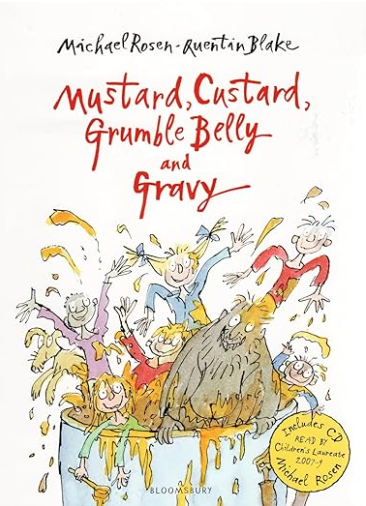
Funky Chickens: Benjamin Zephaniah

Key Stage 2 (Upper)
Being You. Poems of Positivity: Daniel Thompson
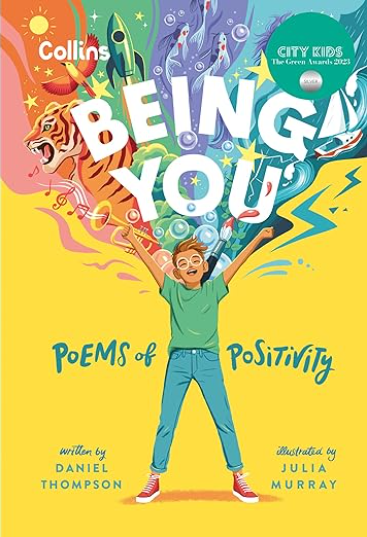
The Final Year: Mike Goodfellow
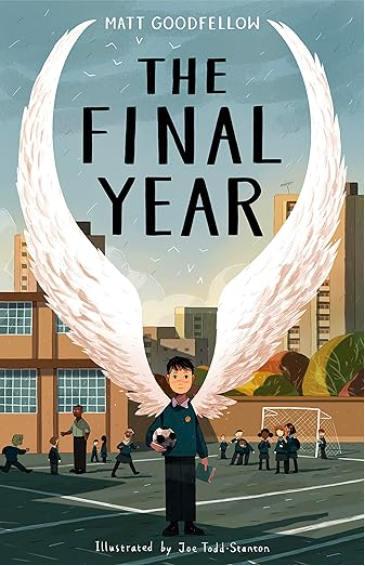
Reading Tips - Make Reading Even More Fun!
Keep an eye on my reading tips section; I’ll be updating it with more fun ideas!
Key Stage 2
Get techy!
In my school workshops, children enjoy watching the book trailer for my Gremlin story – you can find it here on the website – and discussing how it works as a blurb. Why not create your own trailer for a book? (Parents, this is a great way of encouraging ‘gadget’ children to read!) Write, create, and send your trailers to friends and challenge them to create their own. You could organise your own BAFTA or OSCARS exciting awards ceremony party, where each trailer is screened and voted for! Who will be the next fabulous film writer??
Pot the Word!
Number of players: 2+ (Although it can be played on your own!)
For this game you need:
• at least twelve paper cups
• the same number of squares of paper – roughly 13cm by 13cm
• a ping pong/table tennis ball or a screwed-up bit of paper weighted in the middle with a piece of blu tack
• a set of KS2 word cards or words written on pieces of card – you might like to select interesting words from a thesaurus/dictionary
Along the bottom of each square of paper write a selected word from your word cards; a different word per card e.g.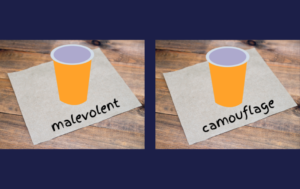 Set the squares of paper up on a tabletop and place a paper cup onto each square above the word. Arrange the cups so that the words can be clearly seen.
Set the squares of paper up on a tabletop and place a paper cup onto each square above the word. Arrange the cups so that the words can be clearly seen.
How to play
Player One selects a card at random from the pile of word cards, reads it out loud and locates where it is on the table. From a distance (chosen and set by the players), Player One has to try to toss the ball into the cup sitting on the matching word without knocking it or any of the other cups over. It is then Player Two’s turn. The first player with a score of five successful ‘pots’ wins the game!
Key Stage 2
Have fun with words!
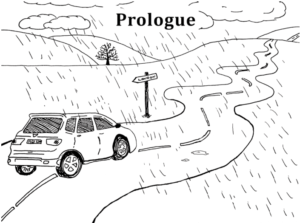
In the prologue, Kade is travelling by car to his Uncle Fitz’s creepy manor house. Grosse Manor’s miles away, so he’s got lots of time to pass! Long car journeys don’t have to be boring though; why not listen to an audio book or play a game like the one below? You can organise some treats as prizes!
Spot the word.
Somebody thinks of a word, e.g. extraordinary. Players look out for roadside advertisements or signs featuring the word. The first person to spot the word (or first person to spot it a set number of times) is the winner.
If you want to take this game to the next level, pick a small word, e.g. in and see how many times you can spot it within other words or signs that you pass. For example, in is within the word Gremlin on the front cover of my book. If you have a copy of my book with you when playing, use it!
‘Less sit, more do readers’
Try magazines, comics, and manuals. Words and pictures work together to make reading fun and visual. Many award-winning animators (like Lance Wilder from the hit U.S.A. TV show ‘The Simpsons’) were big comic and magazine readers as kids!
If you’re a doer, why not pick up a ‘how to make something magazine or manual and build something from the instructions that you can show off to your friends?
Word Power!
Play a word game with Me, Myself and I!
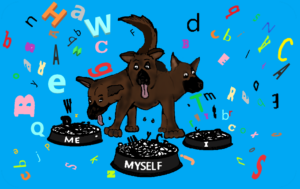
Me, Myself and I likes to eat many things – including words! How many words can you make from his name to fill his doggy bowls? You can only use each letter for the number of times it appears.
Me, Myself and I
Example word: Immensely
HINT: Look for words within words – there are three small words within ‘myself’!
What’s the longest word you can make?